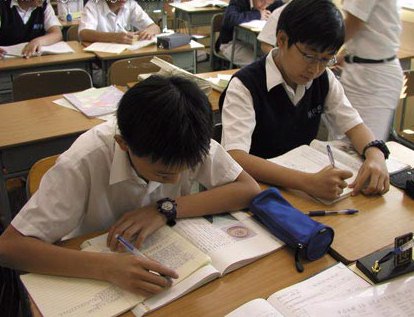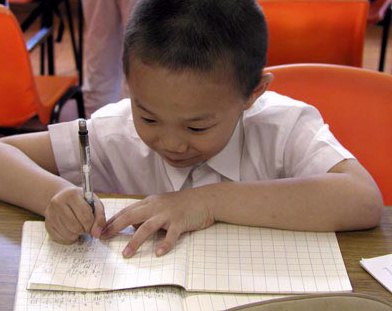|
|
|||||||||||||||||||||||||||||||
|
The Impact of Disaster Capitalism on Hong Kong's Education System
The Commodification of Education
Hong Kong’s education, just like other Britain dominated countries, started off its solid education system under the Britain’s education which involves with A-level and O-level exam. Since 1997 where Hong Kong is passed back to China, Hong Kong’s education system is experiencing major changes. It’s been ten years since the pass over and Hong Kong’s education is still in a conflict of the British’s shadow while following China’s footsteps. By Carmen Chan - 2008. With Britain’s education system being so standardized and China’s education system being so privatized, Hong Kong is striving for the balance between China and Britain’s education system. Although Hong Kong’s education is currently in a crisis with striving the balance in this transition, but the Chinese government had not take the advantage of this disaster. This article will be examining how the Chinese government indirectly uses autocratic power to make policy changes instead of taking the advantage of the transition disaster. The article will contain three parts; Hong Kong education’s history, Hong Kong’s education reform after the pass over, and the influence of Chinese government in Hong Kong education policy. Starting off will be discussing the history and structure of Hong Kong’s education system under the British’s colonies. Since 1942, English had become one of Hong Kong’s official languages. The official languages of Hong Kong had then become a major factor in Hong Kong education schooling structure. The compulsory education of primary and secondary school was enforced by the British government in the 1980s. The major objective of the compulsory education at that period was “keeping problem children off the streets, protecting girls from being kidnapper, and serving China.” (Lee, 1991) Until the early twentieth century, the objectives changed into “providing leaders for the future and offering an alternative to sweated labor in factories.” (Lee, 1991)
Hong Kong’s schooling structure had divided into three types, under the influence of the two official languages. The first type is the Anglo-Chinese Schools which subjects are being taught in both English and Chinese. In this type of school, English is being used as the main instruction language but “Chinese language, literature and history are taught in the Cantonese vernacular.” (Henderson, 1973) Throughout the British colony, the Anglo-Chinese school was the main stream of Hong Kong’s schooling system. The second type of school was the Chinese Middle School. This type of schooling is historically left behind by the Chinese government. The ideology and information was considered in the past and outdated. With the emerging of the new British culture, there’s a major decline of this schooling which is based under the Chinese culture and tradition. The last type of schooling is the National Schools. This type of schooling is what we now known as international schools where English children are being taught by English teachers. Not only English, but other nationality such as German, Japanese and Indian has their own national schools. This type of schooling was mostly for foreign families in Hong Kong and they tend to be more expensive and costly than other local schools. Not that only the schooling structure, but Hong Kong’s education structure and policy at that period was also based upon the Britain’s system. Under the influence of the British education, Hong Kong students are required to complete three years kindergarten, then six years of primary school, then three years of secondary education, then two years of senior secondary. During their senior secondary, students are required to choose between streams; science, arts, and commerce. In their last year of senior secondary, students are required to take the Hong Kong Certificate of Education Examination (HKCEE) exams which are equvalent to the British’s GCSEs or O-levels standardized exams. With qualifying grades, students would then study their Matriculation courses (similar to a senior high secondary) before entering universities or colleges. During their last year of secondary school, students are also required to take another standardized exam called the Hong Kong Advanced Level Examination (HKALE) which is similar to British’s Advanced Level. Under such competitve education struture build by the importance of both the standardize exams, students are learning under the culture of rote learning where the teaching method is focusing in memorizing skills instead of creative thinking or critical thinking skills. Having a basic knowledge in the background of Hong Kong’s education system, this part of the essay will be focusing in the reformation of the education system since the passover in 1997. One of the major changes is the official language. Mandarin (also known as Putonghua) being the official language in China had emerge its importance not only into the society, but also the education system. “Putonghua would become the lanuage of politics and adminstratio; English the lanuage of techonology, commerce, and finance; and Cantonese the language of the family and intimacy.” (Postiglione, 1991) Within the ten years since the passover, anglo-chinese schools are majorly declining with the increase of Chinese middle school. Although there’s a increae in the Chinese middle school, but their teaching culture is still currently following the British system. The only difference between the anglo-chinese school and the chinese middle school is the instruction language. With Mandarin emerging in as well, not only the chinese middle school but also the anglo-chinese school are required to teach an extra subject in Mandarin language. Since the pass over, the ministry had been concern with student’s learning culture. The current issue in Hong Kong education reform is the creativity teaching. Currently the minstry of education in Hong Kong are trying to enforce creativity learning within the secondary school program. “The distinction between creative teaching and teaching for creativity highlights the relative lack of attention to creative teaching, which could lead to teaching for creativity and student creativity.” (Chan, 2007) The ministry would like to reform the learning culture from the rote learning into a learning culture that focuses in creativity and critical thinking learning culture. The ministry is striving for students to learn in a way that they can express their thinking through their work. Although China’s education system is largely privatized, but Hong Kong’s private school had actually decreased. In 1995, there were 178 private schools, but in 2001, it had decreased to 173 private schools in Hong Kong. (Mok, 2004) Most private schools in Hong Kong focus in English being the dominant teaching language and this decline is mostly because of the strong Chinese culture since the pass over. Statistics once done by the University of Hong Kong had asked people on the street about their opinions in their nationality. During the first couple of years since the pass over, majority of Hong Kong people claims themselves as British, but in recent years, Hong Kong people claims themselves as Chinese. Not only did the Chinese government have conduct reform in the education, but this is also shows the importance of the influential factor of the reform in culture beliefs having on the education system.
In comparison to China’s education system, Hong Kong had not experienced such crisis or even shock in its education system. In Klein’s book, she mentioned a section of China’s policy reform by using the Tiananmen Square massacre incident. Although the Tiananmen Square incident is a tragic, but it is the fight of freedom and democracy for the Chinese citizens. “Friedman stressed the more, not less, shock therapy was needed, “China’s initial steps of reform haven been dramatically successful. China can make further dramatic progress by placing still further reliance on free private markets.” (Klein, 2007) Since then China’s reform from communist to capitalist had result success of the country. China’s education had also become more privatized than other developed countries (including Hong Kong). Although China promotes privatize, but Hong Kong is being control through the Chinese government in varies of ways. For example, the rapid increase of private school in China is in comparison to the rapid decline of private school in Hong Kong. Why would Hong Kong’s capitalism of freedom and free trade that is laid by the Britain fall behind China though? Being such a special city, China had try to give flexibility to Hong Kong as much as possible, but on the other hand, China wants to keep Hong Kong as a stepping stone for emerging into the international market. China is in fact learning from the success of Hong Kong in prepared for its future development. Although China keeps its “one country, two systems” policy for Hong Kong, “China, not unlike many other countries, has demonstrated an urge to drive toward excellence vis-ŕ-vis a sense of crisis in education, and/or, a sense of backwardness. This concern, among other factors, had contributed to the restoration of the key-point system and the national college entrance examinations, the emphasis on education for modernization, and hence technical education.” (Postiglione, 1991) In other words, China not only wants to develop and reform Hong Kong’s education, but also China wants to excellence their reform. Friedman believed that a crisis needs to be in a placed for a reform and development for freedom, but in fact, with Hong Kong’s example, I agree with Naomi Klein that changes doesn’t require crisis. In Hong Kong’s transition, the Chinese government didn’t take advantage of a disaster or a crisis to recreate a new education system in Hong Kong. Instead the Chinese government uses indirectly its autocratic power to reform Hong Kong’s education by adding and reforming a new cultural ideology in the education system. The Chinese government had done this reform through an indirect way by keep the confidence of the citizens while implementing its policy changes. Although this political method of policy change had seem to be successful with Hong Kong, but during the beginning of this transition, there had been failure lead by the new Chinese government. In conclusion, the significance of the government transitions had changed Hong Kong’s education system through different generations and decades. The traditional Britain-based education system had strived for improvement as the new government takes over. Not only balancing between China and Britain’s ideology, but the transition had also leaded to improvement. While keeping the traditional Britain-based education system, Hong Kong had also improved by implementing new policy by the flexible support of the new Chinese government. Instead of taking advantage of Hong Kong’s education crisis for a reform, but the Chinese government chooses to indirectly use its autocratic power to improve the education system by excellence it through improvement. Therefore, Friedman’s idea of a crisis or disaster in result a reform for freedom may not always applied, in fact changes doesn’t require crisis as Klein said.
ReferencesChan, D. W. (2007). Creative Teaching in Hong Kong Schools: Constraints and Challenges. Educational Research Journal, 22(1) 1-12. Henderson, N. K. (1973). Education problems and research: a Hong Kong introduction. Hong Kong: University of Hong Kong Dept. of Education Research Unit. Klein, N. (2007). The shock doctrine: the rise of disaster capitalism. New York: Metropolitan Books. Lee, W. O. (1991). Social change and educational problems in Japan, Singapore, and Hong Kong. New York: St. Martin's Press. Mok, K. H., & Tan J. (2004). Globalization and marketization in education: a comparative analysis of Hong Kong and Singapore. Cheltenham, UK: Northampton, MA. Postiglione, G. A. (Eds.).(1991). Education and society in Hong Kong: toward one country and two systems. Armonk, N.Y.: M.E. Sharpe, Inc.
|
|
||||||||||||||||||||||||||||||
|
Website Design + SEO by designSEO.ca ~ Owned + Edited by Suzanne MacNevin | |||||||||||||||||||||||||||||||



